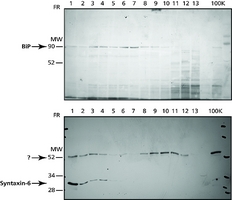Endoplasmic Reticulum Isolation Kit isolation of intact ER from mammalian soft tissues and cultured
详细描述

Properties
| Related Categories | Cell Biology, Cell Fractionation and Organelle Isolation, General Stem Cell Biology, Molecular Biology, Native Protein Sample Preparation, |
| storage temp. | 2-8°C |
Features and Benefits
• Specially formulated extraction reagents for research scale applications - save time and minimize waste
• Includes a calcium chloride solution - for quick and simple precipitation of rough ER without need for ultracentrifugation
• Produces functional, intact organelles - resulting ER are suitable for functional studies, lipid metabolism, and protein profiling
• Compatible with products for structure confirmation - easily confirm intactness with companion kit test for cytochrome C reductase (CY0100)
• Can be used to isolate ER from soft animal tissues and cultured cells
Application
The Endoplasmic Reticulum Isolation Kit contains all the reagents required for ER preparations with various degrees of purity: crude ER (microsomes), Ca2+ precipitated rough ER (RER) enriched microsomes, and density gradient purified rough ER (RER) and smooth ER (SER). The ER isolation process can be monitored by measuring the activity of NADPH cytochrome c reductase using the Cytochrome c Reductase Assay Kit, (Cat. No. CY0100). The enzyme is an ER membrane protein that is commonly used as an ER marker. The isolated ER can be used for studying the cytochrome P450 system and xenobiotic metabolism, for studying lipid metabolism, and for the recovery of ER membrane and lumenal proteins. The kit was tested with rat liver, kidney, and brain; mouse liver; rabbit liver, kidney, spleen, heart, and brain; and with Jurkat and HeLa cell lines.
General description
The endoplasmic reticulum (ER) is a network of interconnected tubules, vesicles, and sacs. It plays a role in specialized cellular functions including protein synthesis, sequestering of calcium, production of steroids, storage and production of glycogen, and insertion of membrane proteins.

